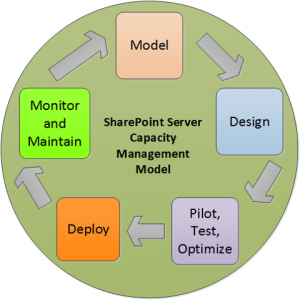Capacity Management Model
1)Model – Analyze existing solutions and estimate expected demands after deployment
2)Design – Propose an architecture you predict will sustain the expected demand
3)Pilot, Test, and Optimize – Roll out pilot with small set of users, analyze pilot results, identify areas needing optimization
4)Deploy – New SharePoint farm, upgrade existing SharePoint farm, or improve performance of existing SharePoint 2013 farm
5)Monitor and Maintain – Monitor server to identify potential bottlenecks
http://technet.microsoft.com/en-us/library/ff758658(v=office.15).aspx
Design
| Role | Type | # of Machines | Processors (GHz) | RAM | IOPS Need | Disk Size OS + Log | Data Drive |
| Web servers | Virtual | 4 | 4 cores | 8 | N/A | 400 GB | N/A |
| Content database server | Standard | 1 cluster | 4 quad-core 2.33 | 48 | 2k | 400 GB | 20 disks of 300GB |
| Application servers | Virtual | 4 | 4 cores | 16 | N/A | 400 GB | N/A |
| Search Crawl Target Web server | Virtual | 1 | 4 cores | 8 | N/A | 400 GB | N/A |
| Search Query server | Standard | 2 | 2 quad-core 2.33 | 32 | N/A | 400 GB | 500GB |
| Search Crawler server | Standard | 2 | 2 quad-core 2.33 | 16 | 400 | 400 GB | N/A |
| Search Crawl DB server | Standard | 1 cluster | 4 quad-core 2.33 | 48 | 4k (tuned for read) | 100 GB | 16 disks of 150GB |
| Search Property Store + Admin DB server | Standard | 1 cluster | 4 quad-core 2.33 | 48 | 2k (tuned for write) | 100 GB | 16 disks of 150GB |
